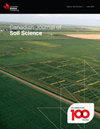Parameter calibration of discrete element simulation for the interaction between heavy soil and soil-engaging components in shellfish culture
IF 1.5
4区 农林科学
Q4 SOIL SCIENCE
引用次数: 0
Abstract
Shellfish culture heavy soils are suitable for the cultivation of marine organisms and are essential for the development of marine fisheries. To study both the interaction between heavy soil particles and that between the soil and soil-engaging components of agricultural machinery in shellfish culture, the simulation parameters in the model were determined. To study the interaction between soil particles in the viscous soil of shellfish culture with moisture content of 26.51% ± 1%. Discrete element method is used to establish the accumulation simulation experiment; the contact parameters between soil particles were calibrated. The response surface optimization technique was used to create the accumulation angle regression model. To study the interaction between the soil and soil-engaging components, the static friction coefficient between the heavy soil and soil-engaging components was determined by static friction experiment. The contact parameters between the soil and soil-engaging components were calibrated by the slope simulation experiment; the rolling distance regression model was established by response surface optimization methodology. The findings demonstrate that the optimized soil model can simulate the actual soil, and reflect the interaction between the heavy soil particles, soil, and the soil-engaging components of agricultural machinery, which not only provides a theoretical basis for the design and optimization of soil-engaging components of agricultural machinery in heavy soil, but also provides a new way for the research and development of agricultural machinery in a complex environment.贝类养殖中重质土壤与土壤参与成分相互作用的离散元模拟参数校准
贝类养殖重质土壤适合海洋生物的养殖,对海洋渔业的发展至关重要。为了研究贝类养殖中重质土壤颗粒之间的相互作用以及土壤与农业机械吸土部件之间的相互作用,确定了模型中的模拟参数。研究含水率为26.51%±1%的贝类养殖粘性土中土壤颗粒间的相互作用。采用离散元法建立累积模拟实验;标定了土壤颗粒间的接触参数。利用响应面优化技术建立堆积角回归模型。为了研究土壤与黏性成分之间的相互作用,通过静摩擦试验确定了重质土壤与黏性成分之间的静摩擦系数。通过坡面模拟试验,标定了土壤与土壤接合部件之间的接触参数;采用响应面优化方法建立滚动距离回归模型。结果表明,优化后的土壤模型能够模拟实际土壤,反映重质土壤颗粒、土壤和农机吸土部件之间的相互作用,不仅为重质土壤中农机吸土部件的设计与优化提供了理论依据,也为复杂环境下农机的研发提供了新的途径。
本文章由计算机程序翻译,如有差异,请以英文原文为准。
求助全文
约1分钟内获得全文
求助全文
来源期刊

Canadian Journal of Soil Science
农林科学-土壤科学
CiteScore
2.90
自引率
11.80%
发文量
73
审稿时长
6.0 months
期刊介绍:
The Canadian Journal of Soil Science is an international peer-reviewed journal published in cooperation with the Canadian Society of Soil Science. The journal publishes original research on the use, management, structure and development of soils and draws from the disciplines of soil science, agrometeorology, ecology, agricultural engineering, environmental science, hydrology, forestry, geology, geography and climatology. Research is published in a number of topic sections including: agrometeorology; ecology, biological processes and plant interactions; composition and chemical processes; physical processes and interfaces; genesis, landscape processes and relationships; contamination and environmental stewardship; and management for agricultural, forestry and urban uses.
 求助内容:
求助内容: 应助结果提醒方式:
应助结果提醒方式:


